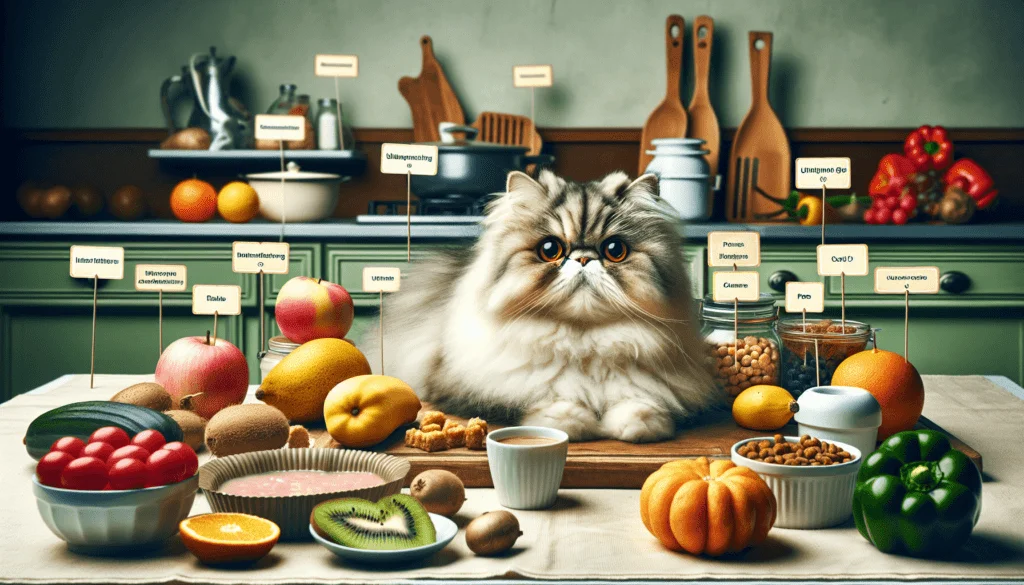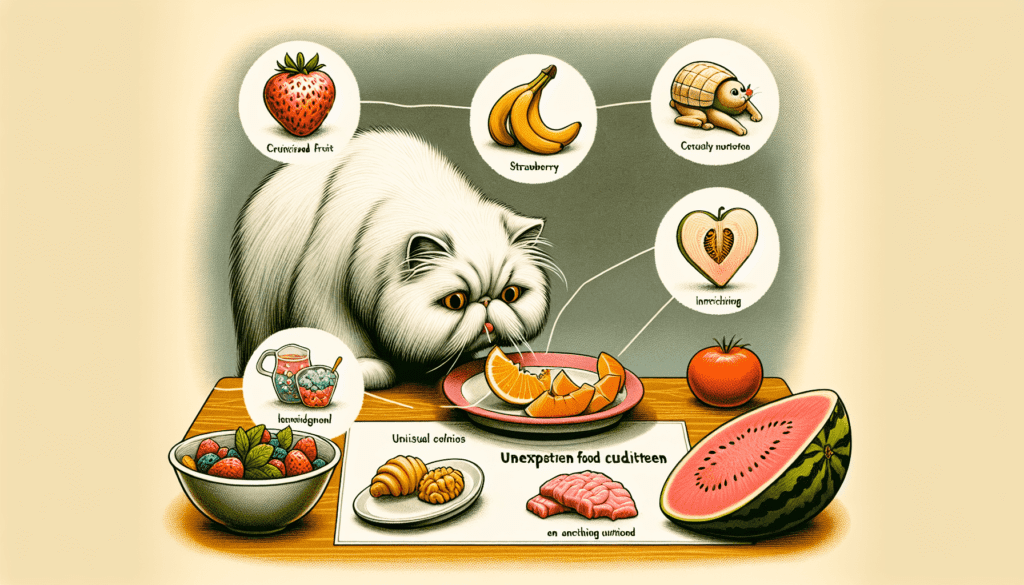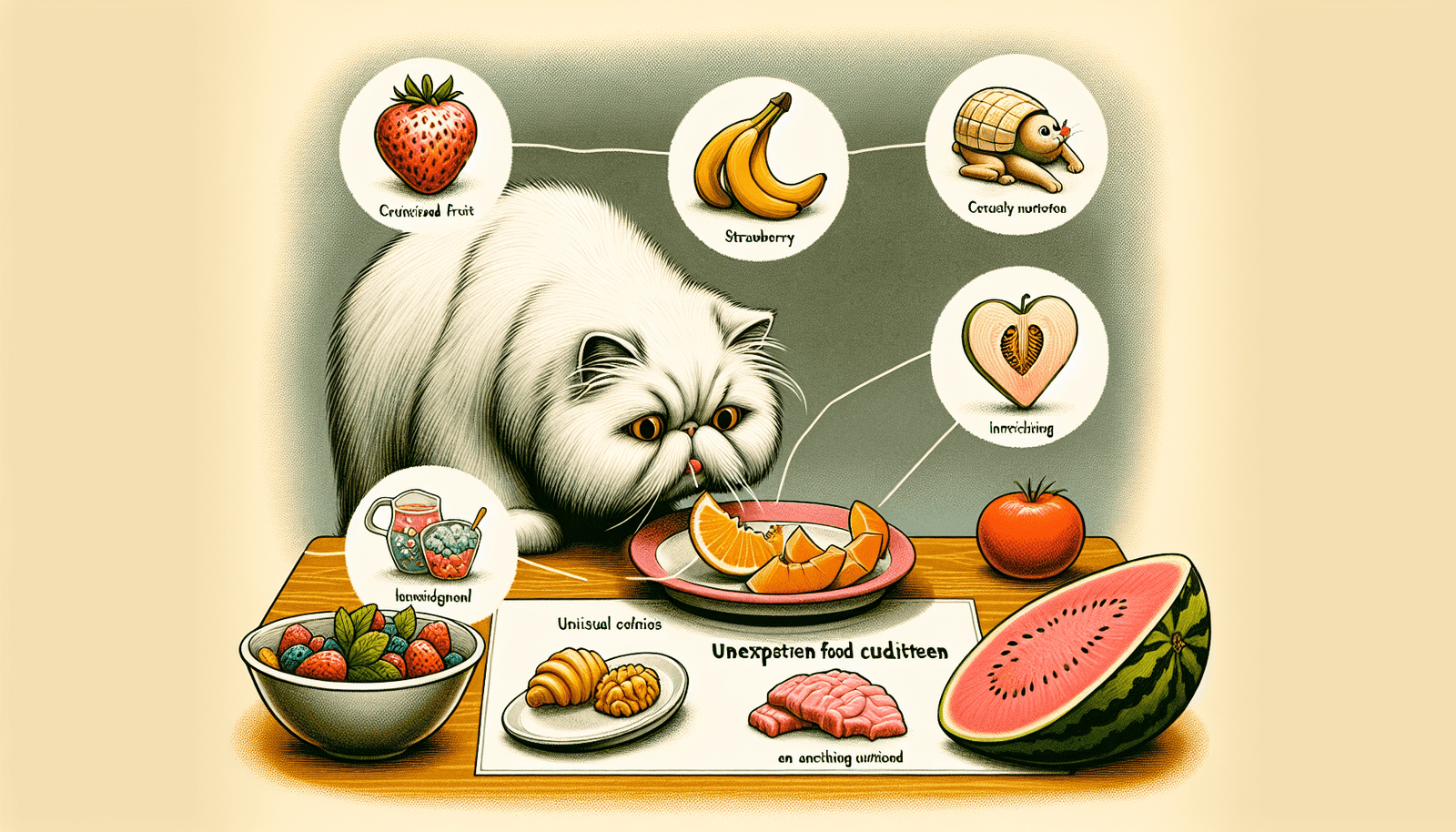If you’re a proud Persian cat owner, you might be wondering about the unique treats you can offer your feline companion. While it’s important to stick to a nutritious diet, there are actually some unusual food items that Persian cats can safely indulge in. From fruits to vegetables and even a surprising option or two, this article will explore some unexpected but delightful treats that will keep your Persian cat purring with satisfaction.
Fish-based treats
Salmon
Salmon is a fantastic choice when it comes to fish-based treats for your Persian cat. It is not only delicious but also packed with omega-3 fatty acids, which are essential for your cat’s overall health and well-being. Omega-3 fatty acids promote healthy skin and coat, reduce inflammation, and even support brain development. When feeding salmon to your feline friend, make sure it is cooked thoroughly and free from any seasonings or added ingredients that may be harmful to cats.
Tuna
Tuna is another fish-based treat that Persian cats can safely enjoy. It is a great source of lean protein, providing your cat with the necessary nutrients for muscle strength and growth. However, it is important to note that tuna should only be given as an occasional treat due to its high mercury content. Excessive consumption of tuna can lead to mercury poisoning, which can have serious health implications for your cat. Therefore, moderation is key when including tuna in your Persian cat’s diet.
Sardines
Sardines are small oily fish that can be an excellent addition to your Persian cat’s treat menu. These tiny fish are packed with essential nutrients such as omega-3 fatty acids, vitamin D, and calcium. Calcium, in particular, plays a vital role in maintaining strong bones and teeth in cats. However, it is essential to use sardines packed in water or oil without any added salt or seasonings. Excess sodium can be harmful to cats, so always opt for a simple and natural variety of sardines.
Cooked meats
Chicken
Cooked chicken is a popular and easily accessible source of lean protein for your Persian cat. It is well-tolerated by most cats and can be a wholesome treat that they’ll absolutely love. Ensure that the chicken is thoroughly cooked without any seasoning, herbs, or spices, as some ingredients commonly found in human food can be toxic to cats. Always remove the skin and bones before offering cooked chicken to your feline companion to prevent any potential gastrointestinal issues or choking hazards.
Turkey
Turkey is another excellent option when it comes to cooked meats that Persian cats can safely eat. It is a lean protein source that provides essential amino acids for your cat’s muscle development and overall growth. Like with chicken, it is crucial to cook the turkey thoroughly and remove any skin or bones before feeding it to your furry friend. Remember, moderation is key, and treats should only make up a small portion of your cat’s overall diet.
Beef
Beef can be included in your Persian cat’s treat repertoire, but it is important to exercise caution when offering this meat. Lean cuts of cooked beef, such as sirloin or tenderloin, can be a rich source of protein and iron for your cat. However, be mindful of the fat content in beef, as excessive consumption can lead to weight gain and digestive issues. Always ensure that the beef is properly cooked, devoid of any additional seasonings or marinades that may not agree with your cat’s sensitive stomach.

Fruits and vegetables
Apples
Apples can be a safe and nutritious fruit option for your Persian cat. They are a good source of vitamins A and C, as well as dietary fiber. However, it is important to remove the seeds and core of the apple before offering it to your cat. Apple seeds contain small amounts of cyanide, which can be harmful if ingested in large quantities. Additionally, always feed apples to your cat in small, bite-sized pieces to prevent choking hazards.
Blueberries
Blueberries are packed with antioxidants and can provide a fun and tasty treat for your Persian cat. They are low in calories and high in fiber, making them an ideal option for a healthy cat snack. The small size of blueberries makes them safe for cats, but as with any treat, moderation is essential. Introduce blueberries gradually into your cat’s diet, and observe for any allergic reactions or digestive upsets.
Carrots
Carrots are not only a crunchy and delicious snack for humans but can also be a great addition to your Persian cat’s treat list. They are an excellent source of vitamin A, which promotes healthy eyesight and supports the immune system. Carrots are also high in fiber, aiding in digestion and promoting dental health. Ensure that the carrots are cooked or grated finely to make them easily digestible for your cat.
Dairy products
Plain yogurt
Plain yogurt can be a healthy and enjoyable treat option for Persian cats, as long as they are not lactose intolerant. It is a good source of calcium and protein, which are vital for your cat’s bone health and muscle development. The live bacteria found in plain yogurt can also promote a healthy gut flora in your feline friend. However, it is important to choose yogurt without any added sugars or artificial sweeteners, as these can be harmful to cats. Start by offering a small amount of yogurt and monitor your cat’s response before incorporating it into their regular treat rotation.
Cheese
Cheese is a popular treat choice for many cats, including Persian breeds. However, it is important to keep in mind that while cats may find cheese delicious, their digestive system may not tolerate lactose well. Opt for low-lactose or lactose-free cheese options to minimize the risk of digestive upset. Additionally, cheese should only be offered in small amounts as an occasional treat, as excessive consumption can lead to weight gain and other health issues. Always consult with your veterinarian to ensure that cheese is a suitable treat option for your specific cat.

Grains and legumes
Cooked rice
Cooked rice can be a safe and beneficial addition to your Persian cat’s diet, particularly if they are experiencing digestive upset or have sensitive stomachs. Plain white or brown rice is easily digestible and can provide your cat with much-needed energy. However, it is crucial to avoid seasoning the rice or adding any toppings or sauces that may not be cat-friendly. Remember, rice should only be a small component of your cat’s overall diet and should not replace a balanced and nutritionally complete cat food.
Quinoa
Quinoa is a nutritious grain alternative that can be incorporated into your Persian cat’s treat rotation. It is rich in protein, fiber, and various essential minerals such as magnesium and phosphorus. Quinoa is also gluten-free, making it a suitable option for cats with sensitivities or allergies to wheat. When feeding quinoa to your cat, ensure that it is cooked thoroughly and free from any added seasonings, oils, or salt, as these can be detrimental to your cat’s health.
Lentils
Lentils can provide an excellent plant-based source of protein and fiber for your Persian cat. They are also rich in essential minerals such as iron, which supports brain function and energy production. When feeding lentils to your cat, it is important to cook them thoroughly and avoid any seasonings or additives. This will ensure that your cat can safely digest and benefit from the nutritional properties of lentils. However, always consult with your veterinarian before introducing lentils or any legumes into your cat’s diet to ensure they are appropriate for your individual cat’s needs.
Eggs
Boiled eggs
Boiled eggs can be a nutritious and protein-rich treat option for your Persian cat. Eggs are a complete source of amino acids and contain essential vitamins and minerals that promote overall health. Ensure that the eggs are hard-boiled and cooled before offering them to your cat. Avoid adding any salt or seasonings, as these can be harmful to cats. Start by offering small pieces of boiled egg to your cat, and if well tolerated, you can incorporate it into their treat rotation occasionally.
Scrambled eggs
Scrambled eggs can also make for a delightful treat for your Persian cat. Like boiled eggs, scrambled eggs provide essential proteins and nutrients. However, it is important to cook the scrambled eggs without any added butter, oil, or seasonings. Offer plain, fully cooked scrambled eggs to your cat in small portions and observe for any adverse reactions. Keep in mind that eggs should only be offered as an occasional treat and should not replace a nutritionally balanced cat food.
Baby food
Pureed chicken
Pureed chicken baby food can be a convenient and safe option for treating your Persian cat. It is important to choose a baby food brand that contains only pureed chicken and water, without any added seasonings or preservatives. Baby food can be an excellent choice for cats that have difficulty eating solid foods or have dental issues. However, it is always recommended to consult with your veterinarian before incorporating baby food into your cat’s diet to ensure it meets their nutritional needs.
Pureed turkey
Similar to pureed chicken baby food, pureed turkey baby food can also be a suitable treat option for Persian cats. Again, ensure that the baby food contains only pureed turkey and water, with no harmful additives. Pureed baby food provides an alternative texture that can be easier for cats with dental problems or older cats with a reduced appetite to consume. Remember to use baby food as an occasional treat and not as a substitute for a complete and balanced cat food.
Pureed vegetables
Pureed vegetable baby foods can offer a variety of nutritional benefits for your Persian cat. However, it is crucial to choose baby food varieties that do not contain any toxic ingredients such as onions or garlic, as these can be harmful to cats. Many vegetables, including carrots, peas, and sweet potatoes, can be safely pureed and offered to your cat. Always check the ingredients list to ensure it aligns with cat-safe vegetable options and consult with your veterinarian if you have any concerns or questions.
Cat-safe herbs
Catnip
Catnip is a well-known herb that many cats find irresistible. It can provide a stimulating and enjoyable experience for your Persian cat. Catnip is perfectly safe for cats and can be used as a treat or enrichment tool. You can sprinkle dried catnip leaves on scratching posts, toys, or bedding to increase your cat’s enjoyment. Just remember that not all cats are affected by catnip, so if your Persian doesn’t seem interested, don’t worry – it’s perfectly normal too!
Parsley
Parsley is a cat-safe herb that can offer some nutritional benefits to your Persian cat. It is a good source of vitamins A and C and can aid in digestion and freshen breath. Parsley can be easily incorporated into your cat’s diet by finely chopping it and mixing it with their regular food as a tasty addition. However, it should only be given in small amounts, as excessive consumption can lead to gastrointestinal upset.
Rosemary
Rosemary is a fragrant herb that is safe for Persian cats when used in moderation. It can add flavor and aroma to your cat’s treats, making them even more enticing. You can experiment with infusing small amounts of dried rosemary into treats or sprinkle a pinch on top of their food. However, be cautious not to use excessive amounts of rosemary, as it may cause gastrointestinal irritation.
Small amounts of safe spices
Cinnamon
In small amounts, cinnamon can be a safe and aromatic spice to introduce to your Persian cat’s diet. It has antimicrobial properties and can aid digestion. Adding a tiny pinch of cinnamon to your cat’s treats or mixing it with their food occasionally can provide a novel experience for your cat. However, always be conservative with the amount of cinnamon used, as too much can be overwhelming or even cause digestive upset. Monitor your cat’s response to cinnamon and discontinue use if any adverse reactions occur.
Ginger
Ginger is another spice that can be used sparingly with Persian cats. It has anti-inflammatory properties and can aid in digestion. Some cats may enjoy the taste of ginger, while others may be less interested. Introduce ginger in very small amounts and monitor your cat’s reactions closely. Discontinue use if any negative symptoms arise, and always consult with your veterinarian before incorporating spices into your cat’s diet.
Turmeric
Turmeric is a spice known for its anti-inflammatory and antioxidant properties. It can be safely introduced to your Persian cat’s diet in small amounts. However, always use caution and start with minimal quantities, as cats may not tolerate the taste or the spice itself. Mixing a tiny pinch of turmeric into your cat’s food or treats can provide potential health benefits, but remember that moderation is key. Regularly monitor your cat’s response to turmeric and discontinue use if any adverse effects occur.
Occasional treats
Plain popcorn
Plain popcorn without added salt, butter, or other seasonings can be a light and enjoyable treat for your Persian cat. It is low in calories and can be a fun option when you’re enjoying a movie night together. However, be mindful of the portion size, as too much popcorn can lead to digestive upset or even pose a choking hazard. Always err on the side of caution and feed popcorn to your cat sparingly.
Cooked pasta
Plain cooked pasta can be a safe and easily digestible treat option for your Persian cat. It provides carbohydrates for energy and can be a delightful addition to their treat rotation. Make sure the pasta is thoroughly cooked, free from any sauces or seasonings, and cut into small, bite-sized pieces to prevent any choking hazards. As with any treat, moderation is key, and pasta should not replace a complete and balanced diet.
Baked sweet potato
Baked sweet potato can be a healthy and nutritious treat choice for your Persian cat. Sweet potatoes are rich in dietary fiber, vitamins, and minerals, including vitamin A and potassium. Ensure that the sweet potato is cooked thoroughly and cooled before offering it to your cat. Remove the skin and cut it into small, manageable pieces to avoid any potential choking hazards. Feed sweet potatoes to your cat in moderation, as excessive consumption can lead to digestive upset due to their high fiber content.
In conclusion, while Persian cats may have specific dietary needs and sensitivities, there are a variety of unusual food items that they can safely enjoy as treats. From fish-based treats like salmon, tuna, and sardines to cooked meats like chicken, turkey, and beef, you have several options to entice your feline friend. Additionally, fruits and vegetables such as apples, blueberries, and carrots can provide nutritional benefits while serving as a delightful snack. Dairy products like plain yogurt and cheese can be included in moderation, whereas grains and legumes like cooked rice, quinoa, and lentils can diversify their treat choices. Furthermore, eggs, baby food, cat-safe herbs, small amounts of safe spices, and occasional treats like plain popcorn, cooked pasta, and baked sweet potato can add excitement to your Persian cat’s treat rotation. Always ensure that any treats offered are appropriate for your cat’s unique dietary needs and preferences, and consult with your veterinarian if you have any concerns or questions. With a well-balanced and varied treat selection, you can provide a safe and enjoyable experience for your beloved Persian companion.

